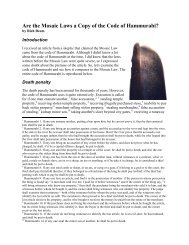Coming to Grips with the Early Church Fathers - Evidence for God ...
Coming to Grips with the Early Church Fathers - Evidence for God ...
Coming to Grips with the Early Church Fathers - Evidence for God ...
Create successful ePaper yourself
Turn your PDF publications into a flip-book with our unique Google optimized e-Paper software.
<strong>Coming</strong> <strong>to</strong> <strong>Grips</strong> <strong>with</strong> <strong>the</strong> <strong>Early</strong> <strong>Church</strong> Fa<strong>the</strong>rs’ Perspective on Genesis John Millam<br />
Ironically, Mook does apply this principle selectively <strong>to</strong> dismiss Augustine’s non-calendar-day<br />
interpretation on <strong>the</strong> basis of Augustine’s dependence on a Latin translation of Genesis. 9 If<br />
Augustine’s Latin-based interpretation is suspect, <strong>the</strong>n should not <strong>the</strong> views of <strong>the</strong> fa<strong>the</strong>rs<br />
mentioned by Mook be questioned <strong>for</strong> <strong>the</strong>ir dependence on Greek? This inconsistency undercuts<br />
<strong>the</strong> objectivity of his analysis.<br />
The main interest in <strong>the</strong> church fa<strong>the</strong>rs stems from <strong>the</strong> assumption that <strong>the</strong>y were closer in<br />
language and culture <strong>to</strong> <strong>the</strong> Bible’s writers. While that is largely true <strong>for</strong> <strong>the</strong> New Testament<br />
(written in Greek), <strong>the</strong> early church lacked a clear understanding of Hebrew and <strong>the</strong> Jewish<br />
culture of <strong>the</strong> Old Testament. 10 In fact, Bradshaw asserts: “Given this evidence, I think it is fair<br />
<strong>to</strong> conclude that at least in its knowledge of Hebrew modern Christian scholarship has <strong>the</strong> edge<br />
over <strong>the</strong> church of <strong>the</strong> third and fourth centuries.” Un<strong>for</strong>tunately, this omission is not <strong>the</strong> only<br />
flaw in Mook’s analysis.<br />
The <strong>Early</strong> <strong>Church</strong> Divided<br />
It is well-acknowledged that <strong>the</strong> church fa<strong>the</strong>rs were by no means unified on how <strong>to</strong> understand<br />
<strong>the</strong> creation days. Even Mook recognizes that Clement of Alexandria, Origen, and Augustine<br />
rejected a calendar-day view, believing instead that everything was created instantly. For<br />
completeness, we should include Hilary of Poitiers and <strong>the</strong> Jewish scholar Philo who believed<br />
likewise, even though Mook does not discuss <strong>the</strong>m.<br />
These facts carry two important consequences <strong>for</strong> Mook’s point. First, <strong>the</strong>re was genuine<br />
disagreement in <strong>the</strong> early church over how <strong>to</strong> best understand <strong>the</strong> days of creation, <strong>with</strong> a small<br />
but significant number rejecting <strong>the</strong> idea that <strong>the</strong>y were “ordinary” days. Second, <strong>the</strong> church<br />
allowed <strong>for</strong> charitable disagreement on this point and did not view it as an issue of orthodoxy.<br />
Recognition that Augustine was <strong>the</strong> single most influential <strong>the</strong>ologian of <strong>the</strong> early church fur<strong>the</strong>r<br />
challenges Mook’s position by demonstrating that opposition <strong>to</strong> a calendar-day view cannot be<br />
dismissed as a mere fringe position.<br />
Mook responds <strong>to</strong> this challenge by dividing <strong>the</strong> church fa<strong>the</strong>rs in<strong>to</strong> two camps: <strong>the</strong> “literalists”<br />
and <strong>the</strong> “allegorists.” In <strong>the</strong> <strong>for</strong>mer, he includes Lactantius, Vic<strong>to</strong>rinus, Ephrem <strong>the</strong> Syrian, and<br />
Basil, all of whom he claims taught a 24-hour days view. 11 In <strong>the</strong> second camp, he places<br />
Clement of Alexandria, Origen, Ambrose, and Augustine. 12 (Hilary and Philo, whom I<br />
mentioned earlier, also belong <strong>to</strong> this group.) While Mook lists Ambrose among <strong>the</strong> allegorists,<br />
he is quick <strong>to</strong> point out that Ambrose largely followed Basil <strong>with</strong> respect <strong>to</strong> Genesis 1. So <strong>for</strong><br />
Mook’s purpose’s, Ambrose can be treated as being among <strong>the</strong> literalists.<br />
The implication of all this is that Augustine and company’s creation views should be dismissed<br />
because—according <strong>to</strong> Mook—<strong>the</strong>y did not interpret Genesis literally. That would support<br />
Mook’s conclusion by effectively removing any early church opposition <strong>to</strong> a calendar-day view.<br />
9. James Mook, “The <strong>Church</strong> Fa<strong>the</strong>rs on Genesis, <strong>the</strong> Flood, and <strong>the</strong> Age of <strong>the</strong> Earth,” 38.<br />
10. Bradshaw, Creationism and <strong>the</strong> <strong>Early</strong> <strong>Church</strong>, chapter 1.<br />
11. James Mook, “The <strong>Church</strong> Fa<strong>the</strong>rs on Genesis, <strong>the</strong> Flood, and <strong>the</strong> Age of <strong>the</strong> Earth,” in <strong>Coming</strong> <strong>to</strong> <strong>Grips</strong> <strong>with</strong><br />
Genesis, eds. Terry Mortenson and Thane H. Ury (Green Forest, AR: Masters Books, 2008), 29–32. Mook lists<br />
Theophilus, Methodius, Epiphanius of Salamis, and Cyril of Jerusalem as all teaching that <strong>the</strong> creation days<br />
were ordinary days, but did not specify <strong>the</strong> days as 24-hours long.<br />
12. Ibid, 32–38.<br />
Page 4 <strong>Evidence</strong> <strong>for</strong> <strong>God</strong> from Science






